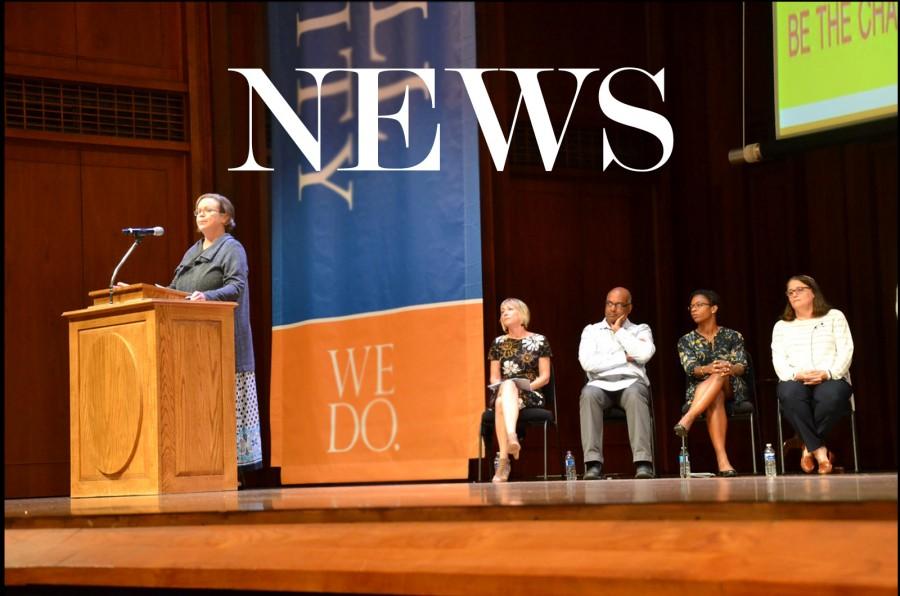“Stories That Shape Us” panel encourages inward exploration
September 16, 2015
Covering many current events, ranging from Caitlyn Jenner to Rachel Dolezal to the Charleston shooting, the Sept. 15 “Stories That Shape Us” panel brought the University community together for a night of important conversation about diversity in the Weis Center.
The event, which took momentum from the Solidarity Ceremony and many other informal campus community discussions over the past semester, was initiated to move the University community forward to create positive social change by being advocates and allies.
Associate Provost for Diversity Bridget Newell, Director of New Student Orientation & Student Leadership Programs Beth Bouchard, and Professor of Art History Roger Rothman spearheaded the search for a panel of several faculty members who could each speak about a specific area of diversity.
Newell, who served as MC, opened up the panel by discussing the importance of stories. She challenged the audience to think of what stories they had already heard about race, class, spirituality, and gender.
“Stories represent and create our realities, expectations, perspectives, and values. Stories help us to learn and to teach,” Newell said.
Newell then handed off the program to Professors Coralynn Davis and Nikki Young, who encouraged audience members to begin exploring their own stories.
“We’re here to talk about sexuality through your own stories,” Davis and Young said.
Davis and Young candidly explored their own sexual stories in anecdotal snapshots to the audience, and mused over questions such as, “Aren’t we the same people we were before? Maybe, maybe not?” in discussing their sexual identities.
“Gender itself is the enemy,” Young said.
Associate Professor of History John Enyeart spoke to students and faculty about poverty and the huge disparity of progress in modern society. Enyeart referenced historical time periods, like the Gilded Age and the 1910s, but perhaps most memorably, skipped the 1920s.
“I’m going to skip over the 1920s because they were mostly spent drinking and voting Republican. Kind of like Bucknell,” Enyeart said.
Associate Professor of Political Science Atiya Stokes-Brown voiced her frustrations onstage with gender identity.
“I’m still grappling with the complexities of gender. Sex is biology, but gender is behavioral and [based on] attitudes. Gender is relative and cultural,” Stokes-Brown said.
Stokes-Brown then posed the question, “Can gender be constructed independently of race, class, ethnicity, and nationality?”
“Inequalities are never the result of a single distinct factor,” Stokes-Brown said.
Associate Professor of Political Science Michael James helped the audience make sense of two current events dealing with racial identity. James used the examples of infamous former NAACP chapter president Rachel Dolezal and the tragic Charleston, S.C. shooting as two great events: one which proved to be farce and the other which proved to be tragedy.
“Rachel thought she could individually make herself black. She was deluded that she as an individual could make herself a race. She thought it was a choice she could intentionally make to suit her own purpose and she thought she could do this obliviously to power,” James said.
Breaking from the previous panelists’ expression through discussion, Rebecca Joseph, Chaplain for the Jewish community, opened her presentation with a recitation of the Havdalah in marking of Rosh Hashanah. Joseph then presented a skit on her own religious experience and told the audience of her decision to observe Jewish traditions.
“I could have gone offstage to do that privately. But had I done that it would have been a missed opportunity and it would have contradicted one of the most important messages of tonight. It gave me an opportunity to connect my story with all of your stories,” Joseph said.
The final panelist, Associate Professor of Philosophy Sheila Lintott, addressed the roles of an ally, advocate, and bystander and admitted that difficult conversations are needed in order for people to think differently about the words they use.
Yik Yak played a surprisingly major role in the event. Bouchard and Bill McCoy, Director of the Office of LGBT Awareness, entertained questions from Yik Yak about student commentary at the end of the event.
Yik Yak’s overall reception of the panel seemed mixed. Some people thought the talks were awesome. Others hated them. Bouchard responded onstage to some of the commenters.
“It’s not important whether you liked what was said. When someone raises a topic that makes you feel uncomfortable, instead of shutting it down or pushing it away, what will you do? You have the power to shape and change your community. That’s what we want you to leave with,” Bouchard said.
“The presentation exposed a lot of diverse perspectives and made me think inward about how I might perpetuate some of these problems in society,” Soham Patel ’19 said.
“As the last speaker said, we sometimes feel uncomfortable and awkward when we have to talk about something that’s not as prevalent in this society, but this conversation and this whole speech gave me the opportunity to think about what the remaining problems are,” Jae Lee ’19 said.






















